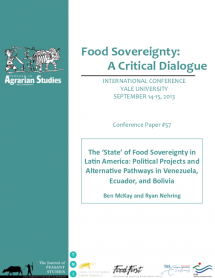The ‘State’ of Food Sovereignty in Latin America Political Projects and Alternative Pathways in Venezuela, Ecuador, and Bolivia
A critical analysis of the role of the state in constructing and pursuing a pathway towards food sovereignty. The most favourable conditions for pursuing a food sovereignty strategy exists when pro-reformist state and societal actors interact in a mutually reinforcing way to restructure relations of control and access over resources and political spaces.

Authors
The concept of food sovereignty has been enshrined in a number of countries’ Constitutions around the world without any clear consensus around what state-sponsored ‘food sovereignty’ initiatives might entail given the complexity and interconnectedness of the global food system. In the vanguard of this movement at the national level has been the so-called ‘pink tide’ of Latin America – namely Venezuela, Ecuador, and Bolivia.
As a constitutional right, food sovereignty presents a significant opening to promote a citizen’s revolution of the food system, but is such a proposal possible or desirable as a top-down initiative? The concept itself is inherently people-led as it implies constructing (or deconstructing) a food system that is defined, led, controlled, and accessed in a culturally appropriate and ecologically sustainable way by local people in a given territory. At the same time, state intervention is a necessary function to confront the global food system, dismantle unequal agrarian structures, and recognize the autonomy of people and communities in defining and controlling their food and agricultural systems.
In different geographies and societies of food sovereignty, it is necessary to evaluate how state and social actors interact in the pursuit of a national food sovereignty strategy, with particular attention to the relations of control and access to decision-making and physical resources. To date, pushes for food sovereignty have been led and carried out at the local and transnational levels by social movements – largely circumventing the involvement of state actors.
So how does food sovereignty manifest itself through a state-led process constitutionally in the national economy? Is it likely that even the most progressive regimes today will consist of pro-reform state actors with the autonomy and capacity to transform agrarian structures and cede political and economic power to communities on the basis of selfdetermination?
Food sovereignty ultimately requires a structural transformation of the economy and society as a whole. It requires a synergetic relationship between state and societal actors able to dismantle power structures through transforming the relations of access and control over resources and decision-making processes.
This paper critically analyzes the role of the state in constructing and pursuing a pathway towards food sovereignty using three country case studies. We argue that the most favourable conditions for pursuing a food sovereignty strategy exist when pro-reformist state and societal actors interact in a mutually reinforcing way to restructure relations of control and access over resources and political spaces.
Ben McKay is a PhD candidate, International Institute of Social Studies (ISS), The Hague, Netherlands Ben McKay’s research focuses on the political economy and ecology of land/resource access and control in Bolivia in the context of the rise of Brazil.
Ryan Nehring is a PhD student, Department of Development Sociology, Cornell University Ryan Nehring’ research interests include the political economy of rural development in Latin America and, more recently, the emergence of Brazilian South-South Cooperation in African agriculture.
Food Sovereignty: a critical dialogue, 14 - 15 September, New Haven.